RCNZ feature: Plasback rural recycling scheme
The Plasback initiative ticks many boxes, from recycling and upcycling to promoting sustainability and innovation in the rural sector
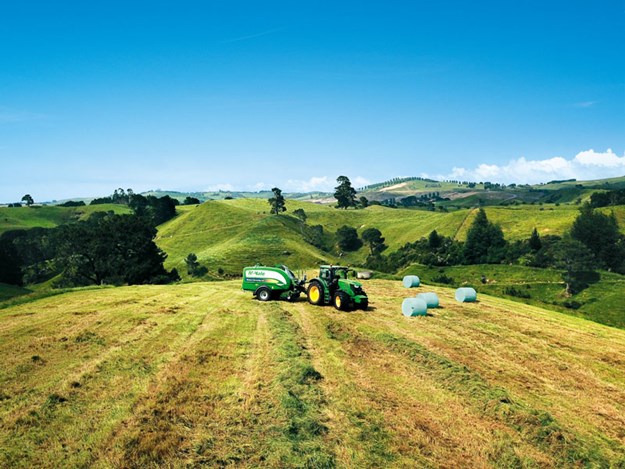 |
|
The Plasback scheme helps farmers and contractors recycle on farm plastic
|
The Plasback rural recycling scheme is transforming the way farmers think about plastic waste. Roger and Helen Slattery are the Waikato-based Plasback contractors, with their catchment region spanning from the Bombay Hills and across the Hauraki Plains and down, as far south as Taupo and Taumaranui.
The Slatterys are also currently compacting product from Northland and the Bay of Plenty as well. Other Plasback operators in the North Island are based in Taranaki and Palmerston North.
Family legacy
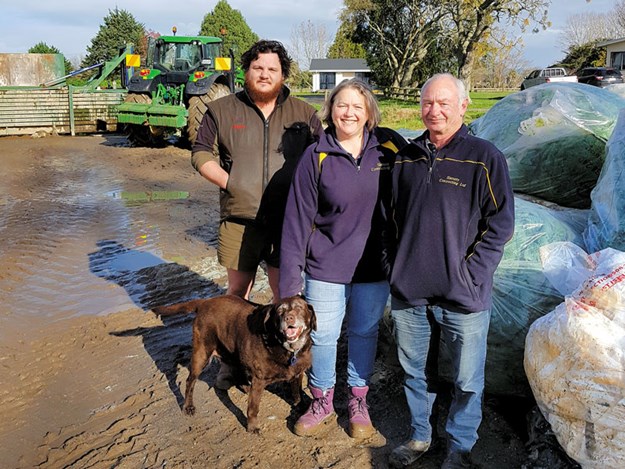 |
|
Cameron Barrie, Helen and Roger Slattery are all keen Plasback advocates
|
Initially founded by Roger’s father and uncle, Slattery Contracting has been operating just outside Matamata for almost 70 years. That’s quite some family legacy, and over the years, the business has continued to grow and evolve. Looking for ways to diversify the contracting business, Helen and Roger became involved with the Plasback scheme from its inception in 2007.
Along with their experienced operations manager Cameron Barrie, who joined the Slattery crew in 2011, the Slatterys service a rapidly expanding Plasback client base throughout their region. The business currently employs five full-time staff plus seasonal employees. "We really value our workers, including our seasonal people and their skill base," says Roger.
Plasback beginnings
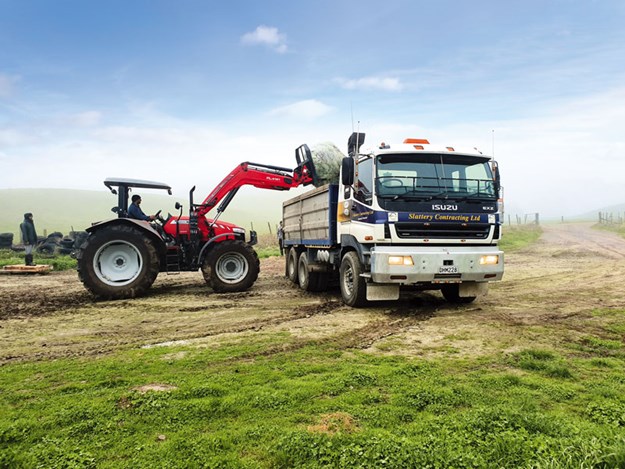 |
|
Slattery Contracting collect and compact the recycled plastic for Plasback
|
Helen, who is also vice president of Rural Contractors NZ, played a role in the initial inspiration behind the conception of Plasback. "About 17 years ago, when our son was born, we were trying to work out what we could do with waste plastic from our farming and contracting clients.
We were talking to Agpac, our plastic wrap supplier, and initially they investigated different ways to reuse the petroleum-based film and recycling came out on top. "I just kept bugging them more and more," she laughs.
"Agpac found out about a scheme in Scotland recycling plastic waste off farms. To cut a long and involved story short: Plasback was born." The Ministry for the Environment accredited scheme is operated by Agpac Ltd, and Slattery Contracting became the second Plasback operator in New Zealand in 2007.
Plasback has grown exponentially, from nine tonnes of plastic compacted and baled in the first 12 months across New Zealand to a whopping 3900 tonnes last year. "Initially it was something we thought it might provide a form of off-season income," says Helen. "However, Plasback is now a full-time, hands-on business."
That’s a wrap
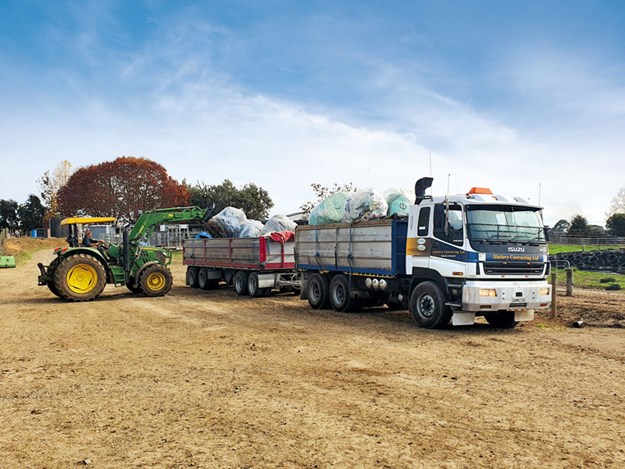 |
|
Thousands of tonnes of farm plastic is now being collected and recycled via Plasback
|
Plasback offers farmers throughout New Zealand the ability to have their farm plastic waste collected for a small fee. Waste can sit on the farms for years or attempts are made to bury or burn it, which no longer sustainably viable options.
Plasback collects silage wrap, cover, and clear plastic shrink wrap from pallets. It also collects polypropylene bags, twines, vine nets, Ecolab drum recovery, and irrigation pipe.
"When the wrap comes off a bale and is not contained, the layers can separate over time and catches easily in the wind," Helen explains, "If you dispose of it in a liner as you take it off the bale, you don’t have to go searching for it later. The longer plastic is left on the ground, the more likely it is to become contaminated."
An excellent instructional Instagram video on the farm4lifenz account demonstrates how silage wrap can be picked up, transformed instantly into a Santa-like sack, slung over the shoulder, and deposited directly into a liner for collection.
Farmers are given clear guidelines regarding which material is suitable for collection. Appropriate waste is put into clear liner bags, which are inspected by Plasback drivers during collection.
There are five streams for collecting waste, with stream four allowing for vineyard nets and HDPS monofilament nets and stream five allowing for twine. Farmers and contractors can call the 0508 phone number or go online to book a collection.
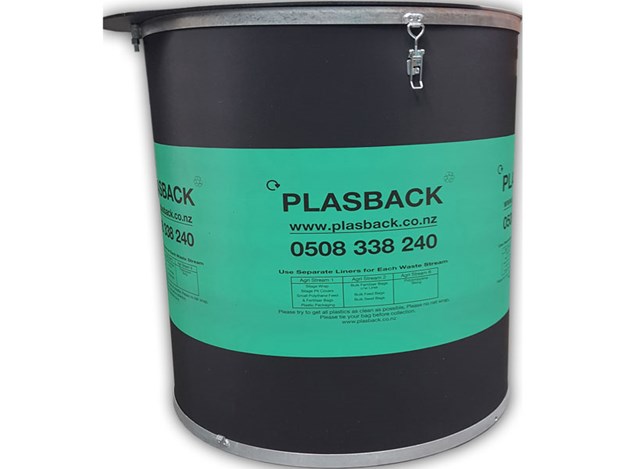 |
|
Made from recycled plastic, the Plasback recycling bin can hold up to 200 standard round bale wraps
|
Farmers buy Plasback collection bins and non-prepaid liners from collectors or through the Plasback website, where there’s also an impressive selection of online videos demonstrating how to pack and fill the liners for maximum volume. Collection for non-prepaid liners is $40 per liner (+GST).
Plasback prepaid product can be purchased through supply stores or online through the Plasback website. Liners must be tied up correctly prior to collection. There’s something of an art to packing this waste plastic and farmers and contractors are continuing to embrace the opportunity to correctly dispose of their plastic and other waste.
Business is steadily growing as more farmers look to recycle. Plasback is promoted to farmers through various product suppliers, and the Te Awa Miraka Farming Excellence Programme also recommends Plasback as part of positive environmental management.
"We send out a dated collection receipt for farmers involved in that programme with Miraka, and other supply companies are requesting similar receipts," Helen explains.
"Initially this movement started from bottom-up pressure. Green farmers or farmer’s wives were the ones seen as being big drivers of recycling. But now it’s young farmers and farm managers who have grown up with recycling who are the biggest advocates. It’s just a normal thing for them to do."
While word of mouth from satisfied customers is the cheapest form of advertising, it’s still the best way to guarantee the success of any business. "And now the older farmers are in on it," says Roger. "Everyone is getting behind it. As we continue to expand and experience growing pains, we keep meeting with Plasback to determine what the future looks like.
That means more planning and looking at placing new balers in new locations. For example, it’s more economical to transport product from up North in a compacted bale than loose in the bags."
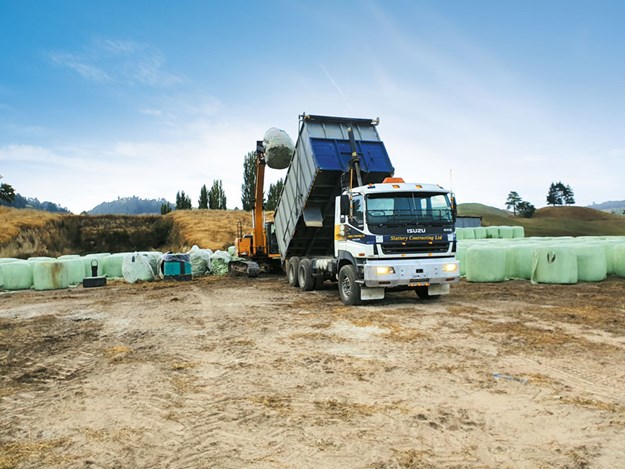 |
|
Demand for on-farm pick up services continues to grow
|
Cameron agrees, recalling that when he started it was with a double axle truck with a crane, which allowed for the pick-up of 10 bags for a full load. "Now we go out and pick up product with truck and trailers. While we might only pick up three-quarters of a bag from a lifestyle block, we could also go down to a Landcorp farm and fill an entire truck and trailer load in one hit.
We could go back down the next day and pick up another full load. And goat farmers are a year-round client for us." The Slatterys tried to schedule a bit of downtime for themselves this winter, however, COVID scuttled their plans.
"COVID presented a few headaches," says Cameron. "During level four, we were unable to pick up plastic from farms." As lockdown conditions eased, the Slatterys have been busy playing catch-up with tonnes of additional material to collect and compact.
A large section of the Slattery Contracting yard in front of the site office accommodates stacks of plastic liners, waiting to be compacted, and rows of compacted bales. "The compactor itself is owned by Plasback," says Helen. "We run it and organise any maintenance required."
Recycling and upcycling
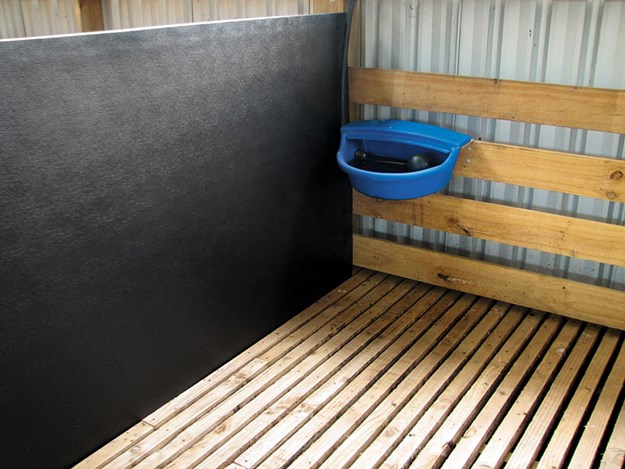 |
|
The black Tuffboard, supplied by Plasback, is made from 100% recycled plastic
|
Plasback is an accredited Product Stewardship from the Ministry of Environment and part of that is demonstrating a closed-loop system. "We are the reason plastic goes on farms," Cameron points out, "and we are the reason it comes off. It starts and finishes with us."
And herein lies the beauty of the operation. The clue is in the name Plasback, as the purpose of the whole business is to recycle waste product and transform it into reusable products for the rural industry.
One such product, Tuffboard, for example, is an excellent plywood replacement for calf pens. It’s promoted as being lick-proof, chew-proof, long-lasting, and a viable alternative to treated timber. Some line their palm kernel sheds with it and pig and deer farmers are using it now as well.
Tuffboard can be purchased in a roll or sheet and produced in different thicknesses and textures. Engineers are also using Plasback lining in horse trucks, as the material is proving all but indestructible.
It’s possible for a horse to put its hoof through a piece of plywood and damage itself in the process. Plasback offers a sturdier longer-lasting product. The key for Plasback’s continuation is for rural and construction industries to keep buying these innovative recycled products.
Recycling plus
"Initially we saw plastic recycling as means to earn a bit of money in our downtime," says Helen, "but now it’s really awesome to be able to help famers handle their recycling efficiently, to be able to keep our staff employed year-round and to see a sustainable industry grow from this." ‘It’s just incredible to see the amount of plastic recycled now," agrees Roger, "particularly when you think about what used to happen to the majority of it.
"Our staff are all on-board with this. They are the best advocates with the farmers, and the drivers are the face of our business and passionate about recycling. The key to this is education. Our staff explain to farmers what we are trying to achieve, show them the best ways to pack their liners, and happily provide any tips that may help."
Plasback drivers also provide a vital connection to people in isolated communities.
"For some farmers in the backblocks, they might not see anybody else for a couple of weeks," says Roger.
The Slattery Contracting drivers have been trained up in the Good Yarn programme through Rural Contractors New Zealand, which was devised to encourage employees in rural and urban workplaces to talk about their mental wellbeing.
"It was actually quite important during the pay-out drop, when lots of farmers were really stressed out," says Cameron. "And the 10 or 20 minutes that our drivers had to say gidday, how are you, or complain about the weather with farmers was a vital outlet.
"Some farmers may have felt under pressure or a bit lost and our drivers were able to spend some time with them. Taking that extra time to have a chat might have made our runs a bit longer, but it may also have saved a life, helped ensure some of those farmers would stay around. "Plasback has come up with an innovative way to help save our environment and support our people. What can be more important than that?"
Find new and used farm machinery for sale in NZ
Keep up to date in the industry by signing up to Farm Trader's free newsletter or liking us on Facebook












.jpg)
.jpg)


